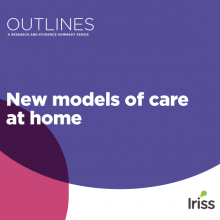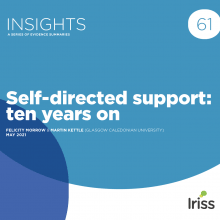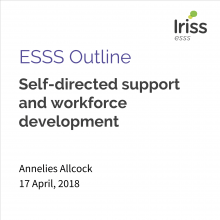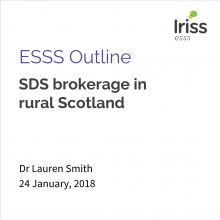Pam Duncan, policy officer at Independent Living in Scotland project, speaks about what self-directed support can achieve and some of the issues that need to be considered.
In terms of the progress that we've made, I think that there is a much stronger understanding of disabled people as free and equal citizens in society. I wouldn't say that we are fully there yet but people understand that disabled people have now the same expectation as other people, and they want to be equal members in society, and they recognise that that is their right. And that's becoming stronger within the movement from the grass roots up, and it's also a message that organisations such as ourselves are taking to the Scottish government. So that's definitely a move in the right direction. The focus of self directed support as opposed to a more traditional method of care and support definitely demonstrates that. So it puts principles such as choice and control at the center of social care delivery.
One danger in that is that it becomes choice over the process, control over the process, choice over the person, control over the person. Control over the person within a reasonable and legal limit, of course, rather than choice in the wider sense, i.e having enough hours of support, allows me to make the choices to live my life as I chose, rather than have to be home at this time, have to go to the shop at that time, must show up at this place because the person will only use the local service, rather than the bigger superstore, you know, things like that so whilst the principles of choice, control and freedom are definitely now hopefully going to be on the statute books as part of the self directed support bill It's important that people understand that those principles don't only relate to the specific processes involved in delivering self directed support but actually key to the equal and full participation of disabled people in society themselves.
There's a couple of areas I think have not yet been addressed but they could pose problems in the future. One of them is eligibility, and the issue, and this has been raised at various events that we've spoken at, and I know that we've also spoken with the Scottish government, so it's something that lots of people will have heard. There's something that comes back all the time as, at the minute, you're only getting support, which is life and limb, literally, priority one, because of the financial situation that we face, and so if you can only get that, then the delivery becomes self delivered support which is essential and a step in the right direction.
What about all the people that are priority two, three, and four, and in actual fact independent living is very much essential to all of those people as well and for some people very little support that can be considered potentially priority four, for example, which could be social support, absolutely essential to this though an integration or participation of disabled people, so that's, I think, something we need to address as a society, and that issue is not something that individual social workers for example, can change on their own but it is something that they can advocate and pass up and down corporately I think there's a lot of political decisions that will need to be taken in order to address that, for example, where do we spend our money and where do we prioritise resources and I think those things are all going to be absolutely essential.
We all know that we're in a tight fiscal climate we don't have much money floating around but there are different things that we can do with our money, we can prioritise definitely at council level not just at individual level, in terms of self directed support is often seen as the individual will buy, get more value for money, basically, not necessarily cheaper, but will get better value for money, and that's true. But we also have decisions to take a corporate budgeting decision level, so for example, how much money do we want to spend on cycle lanes vs social care.
These are very political decisions and I'm not about to right now start some of the the debates on, make the arguments for those debates, but those are the sort of things that need to be discussed in the future I think. You know as a society, what is it we want to spend our money on, in relation to that is community care charging, and I think that's a huge issue, for many disabled people. So for those, for example, who are lucky enough to be eligible, secure a service, and then hopefully as well secure that service through self-directed support, which will hopefully become much more of the norm.
There are sometimes, in fact a very prohibitive charge for disabled people, and not just disabled people but all people who access community care services under the age of 65 and some over the age of 65 depending on the service. That charge is sometimes so prohibitive that it stops people from accessing it.
The reason that local authorities are charging is they say because of the shortfall in the money. And that, again, comes down to political decisions about how else could you plug that gap. 47.5 percent of disabled people live in poverty. They do not have the money to plug that gap. And to have to make a decision based on either paying for food and bills, or housing costs vs. your essential community care. Just getting out of bed in the morning is a very, very difficult decision for people to take in something that I think politically, and as a society as a whole, I think we need to start thinking about and I think it comes down to how we value social care as a society.




